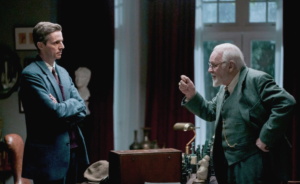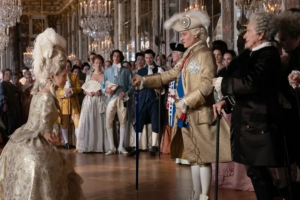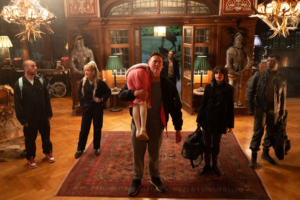Reviewed by GREG KING
Director: Trey Edwardes Shults
Stars: Joel Edgerton, Carme Ejogo, Kelvin Harrison jr, Christopher Abbott, Riley Keogh, Griffin Robert Faulkner.
Just when you thought it was safe to go back into the woods comes this extremely low budget horror film from the US.

It Comes At Night is not your traditional slasher/monster horror film but it is surprisingly effective and unsettling. It Comes At Night is more of a psychological thriller that develops an atmosphere of fear and suspicion and it follows nicely in the footsteps of other recent low budget horror films that have punched above their weight, like It Follows, and the Australian thriller The Babadook, etc.
Set in a not too distant post-apocalyptic future, a deadly unknown contagion has decimated much of the population. A close-knit family of survivalists – Paul (Joel Edgerton), his African-American wife Sarah (Carmen Ejogo) and their 17-year old son Travis (Kelvin Harrison jr) – live in fear and are holed up in their cabin in the woods. The windows are boarded up and the doors are sealed. Paul has established a strict set of rules to ensure their survival – they wear gas masks whenever leaving the house, and they never leave at night. Their isolated existence seems to suit them.
When we first meet the family though they are not in a happy place. Sarah’s elderly father has become sick, his skin covered in ugly sores and he is vomiting up black goo. Paul and Travis bundle the old man into a wheelbarrow and wheel him out into the woods where they kill him, burn the body and bury him.
One day a stranger breaks into their house thinking it is abandoned. He is Will (Christopher Abbott, from A Most Violent Year, etc), and he is looking for food and supplies to help his own family, his wife Kim (Riley Keogh) and young son Andrew (Griffin Robert Faulkner). Paul initially distrusts him, but then reluctantly agrees to let him and his young family move in with them. There is strength in numbers and the two families settle in uneasily. But soon suspicion, paranoia and mistrust take hold and the tension rises as one small lie has consequences for the two families. Events are largely seen from the perspective of Travis, who is consumed by nightmares and grows increasingly fascinated with Will’s family.
It Comes At Night is something of a character study as it explores how we fear what we cannot see or understand. The film explores themes of masculinity, fatherhood, family and the lengths a father will go to in order to protect his family. This is the second feature for writer/director Trey Edwardes Shults, whose previous film was the little seen 2015 drama Krisha). He develops an unsettling atmosphere with this scenario. The film is rooted in a disturbing nightmarish world, and Shults effectively plays on our fear of the unknown. This is a slow burn thriller, but Shults develops a genuine air of uneasiness, and manages to pace the film with some well-timed jump scares. Audiences are left wondering about details, and there is a nice ambiguity to much of what happens. Many elements of the script remain underdeveloped. There is little background information on the characters.
Shults draws good performances from his small ensemble cast. Edgerton, who seems to be choosing some interesting roles, delivers a solid performance as the taciturn Paul. This ranks as one of his best performances. This is a breakthrough performance for young Harrison who plays an adolescent on the cusp of adulthood.
This is lean and sparse filmmaking, but it is also effectively bleak in its outlook. Shults adopts a minimalist style that is surprisingly effective and he makes the most of his limited budget and resources. His direction is restrained and he brings a sense of palpable tension to the material. He uses the confines of the house and the hallways to generate some claustrophobic tension here. The production design from Karen Murphy (who worked on Baz Luhrmann’s The Great Gatsby, etc) is effective. Cinematographer Drew Daniels, who also worked with Shults on Krisha, works with natural lighting which enhances the air of unease that permeates the material. The unsettling and moody score from Brian McOmber also enhances the atmosphere.
★★★☆



